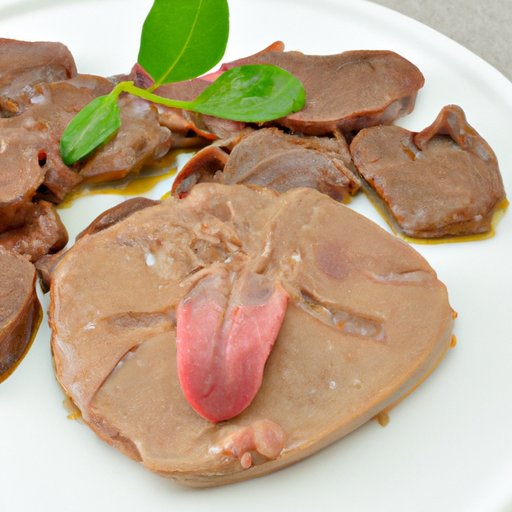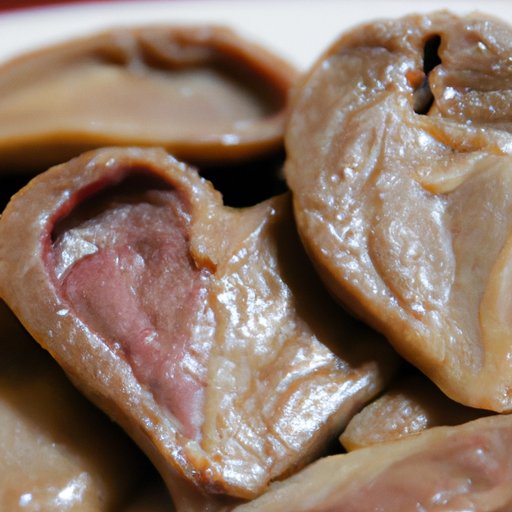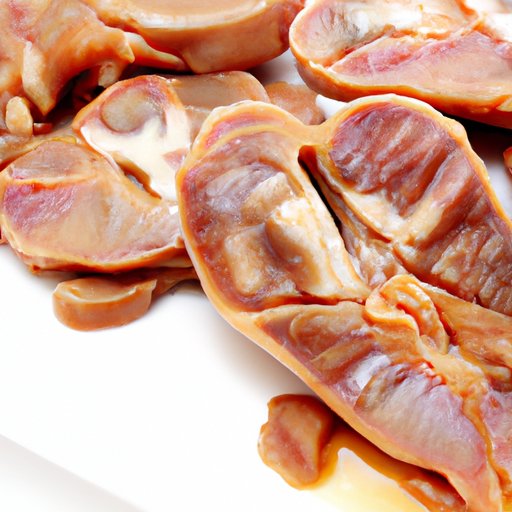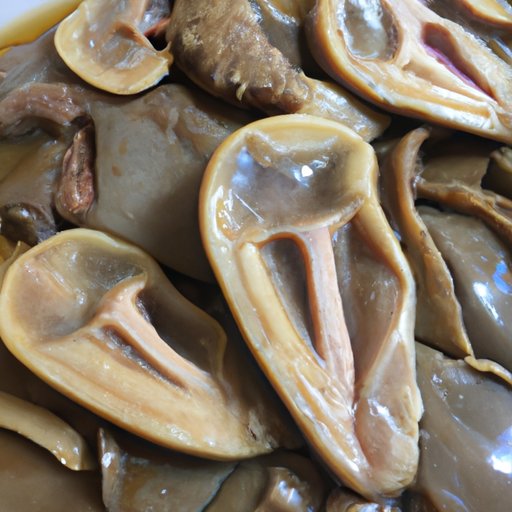Introduction
Cow tongue has been a popular dish for centuries, but is it really healthy? It’s not uncommon for people to be wary of eating organ meats like cow tongue due to their strong flavor and texture. However, cow tongue is actually a nutritious source of protein, vitamins, and minerals that can offer many health benefits. In this article, we will explore the nutritional value of cow tongue and examine the potential health risks associated with consuming it.

Exploring the Nutritional Benefits of Cow Tongue
Cow tongue is a good source of protein and contains many essential vitamins and minerals. According to the USDA National Nutrient Database, 100 grams of cooked cow tongue provides about 218 calories, 16.4 grams of protein, 12.3 grams of fat, and 0 grams of carbohydrates. Cow tongue is also a good source of iron, zinc, phosphorus, potassium, magnesium, and B vitamins like niacin, vitamin B6, and folate. Additionally, cow tongue is a rich source of collagen, which is important for joint health and skin elasticity.
The health benefits associated with consuming cow tongue include improved muscle growth and maintenance, better digestion, stronger bones and teeth, healthier skin and hair, and reduced inflammation. Additionally, consuming cow tongue may help to reduce the risk of certain chronic conditions such as heart disease, diabetes, and cancer.
Is Eating Cow Tongue Good for You?
When it comes to the pros and cons of eating cow tongue, it’s important to consider both the potential health benefits and risks associated with consuming it. On the one hand, cow tongue is a nutritious source of protein and contains many essential vitamins and minerals. On the other hand, there are potential health risks associated with eating cow tongue, such as food-borne illnesses and allergic reactions.

A Closer Look at the Health Pros and Cons of Eating Cow Tongue
Let’s take a closer look at the nutritional value and potential health risks associated with consuming cow tongue. First, let’s examine the nutritional value of cow tongue. As mentioned above, cow tongue is a good source of protein and contains many essential vitamins and minerals. Additionally, cow tongue is a rich source of collagen, which is important for joint health and skin elasticity.
Now, let’s investigate the potential health risks of eating cow tongue. Eating undercooked or raw cow tongue may lead to food-borne illnesses such as E. coli, salmonella, and listeria. Additionally, some people may be allergic to cow tongue, which can cause symptoms such as skin rash, hives, and difficulty breathing.
What to Consider Before Eating Cow Tongue
If you’re considering eating cow tongue, there are a few things to consider before doing so. First, it’s important to ensure that the cow tongue is properly prepared and cooked. Raw or undercooked cow tongue can contain harmful bacteria that could make you sick. It’s also important to be aware of any potential allergies you may have to cow tongue. If you’re unsure of whether you’re allergic to cow tongue, it’s best to consult your doctor first.
The Surprising Health Benefits of Eating Cow Tongue
Despite its strong flavor and texture, cow tongue is actually a nutritious source of protein and contains many essential vitamins and minerals. Eating cow tongue may provide a number of health benefits, including improved muscle growth and maintenance, better digestion, stronger bones and teeth, healthier skin and hair, and reduced inflammation. Additionally, consuming cow tongue may help to reduce the risk of certain chronic conditions such as heart disease, diabetes, and cancer.

Examining the Health Risks of Eating Cow Tongue
It’s important to be aware of the potential health risks associated with eating cow tongue. Eating undercooked or raw cow tongue may lead to food-borne illnesses such as E. coli, salmonella, and listeria. Additionally, some people may be allergic to cow tongue, which can cause symptoms such as skin rash, hives, and difficulty breathing.
Uncovering the Facts about Cow Tongue: Is it Healthy or Not?
Cow tongue has been a popular dish for centuries, but is it really healthy? After exploring the nutritional value and potential health risks associated with cow tongue, it’s clear that it can be a nutritious and beneficial addition to your diet. However, it’s important to ensure that the cow tongue is properly prepared and cooked to avoid potential food-borne illnesses. Additionally, if you’re unsure of whether you’re allergic to cow tongue, it’s best to consult your doctor first.
Conclusion
In conclusion, cow tongue can be a nutritious and beneficial addition to your diet. It’s an excellent source of protein and contains many essential vitamins and minerals. Additionally, consuming cow tongue may provide numerous health benefits, such as improved muscle growth and maintenance, better digestion, stronger bones and teeth, healthier skin and hair, and reduced inflammation. However, it’s important to ensure that the cow tongue is properly prepared and cooked to avoid potential food-borne illnesses. Additionally, if you’re unsure of whether you’re allergic to cow tongue, it’s best to consult your doctor first.
(Note: Is this article not meeting your expectations? Do you have knowledge or insights to share? Unlock new opportunities and expand your reach by joining our authors team. Click Registration to join us and share your expertise with our readers.)
